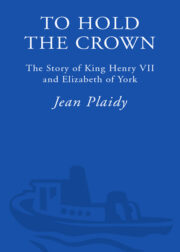The Queen came to Eltham—beautiful and remote. She was clearly very distressed by the state of her little daughter’s health. Henry wondered why, because she saw very little of her. It was Anne Oxenbrigge who made such a fuss, going about with red eyes and turning away every now and then to choke back her sobs.
Death! He knew it happened to traitors. He had seen their heads on poles. He used to count them when he rode through the streets from Eltham to Westminster or Shene. But that death should come to the royal nursery, that was different.
There were physicians everywhere. His father and his mother were in the nursery together. The rest of the children were sent out. They waited in an ante room; and then Arthur was called in.
“She is dying,” said Margaret. “We shall have no sister now.”
“I have one,” said Henry.
“I haven’t,” she said. “But I have two brothers. You only have one.”
“I don’t want two brothers.”
“You’re only a baby yet.”
How she liked to taunt him with that. It was because she knew it was what he hated more than anything.
“I don’t want any sisters either,” said Henry ominously.
“And I only want one brother . . . dear Arthur who is the nicest brother. I don’t want a silly baby brother. . . .”
Henry flew at her. He already showed signs of possessing a quick temper, which alarmed Anne Oxenbrigge.
It was Anne who came in now.
“For shame!” she said. “Fighting when your little sister is dying. What do you think the King and Queen would say to that?”
“They won’t know,” said Margaret slyly.
“God will,” Anne reminded her.
Both children were silent, contemplating the awfulness of God’s watching them.
“So,” went on Anne, having made her point, “you should be very careful.”
They were subdued. Henry whispered a prayer: “I didn’t mean it, God. It wasn’t my fault. It was Margaret. You know what a silly girl she is.”
He had made up his mind that he was always going to do what God would like, for he had heard it said that a king needed good allies and Henry had reasoned that God was the best ally any man could have.
The Queen had come out of the nursery. She came to the children and embraced them solemnly. They knew what that meant. Then Arthur came out with the King, and the King said very quietly: “My children, you have no sister Elizabeth now. She has gone to live with God and His angels.”
Elizabeth was buried in the new chapel her father had built in Westminster Abbey.
The Scottish Court
James was cynical. How could he be otherwise? His countrymen must be the most quarrelsome in the world—with the exception of the Irish who might be said to be even worse; and another thing they had in common was perpetual hatred of the English. No matter what truces they made, no matter how many treaties were signed, how often they exchanged the kiss of peace, the antipathy was always there. It was as natural as breathing. The people below the Border were regarded as enemies by every Scotsman living above it.


"To Hold the Crown: The Story of King Henry VII and Elizabeth of York" отзывы
Отзывы читателей о книге "To Hold the Crown: The Story of King Henry VII and Elizabeth of York". Читайте комментарии и мнения людей о произведении.
Понравилась книга? Поделитесь впечатлениями - оставьте Ваш отзыв и расскажите о книге "To Hold the Crown: The Story of King Henry VII and Elizabeth of York" друзьям в соцсетях.